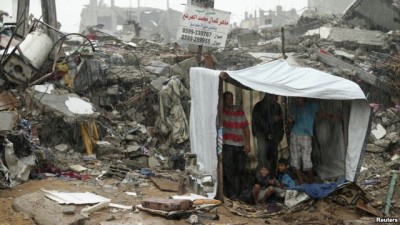As Conditions in Gaza Worsen, Residents Ask: ‘Where Have all the Activists Gone?’

Image: Palestinians take cover from rain inside a makeshift shelter near the ruins of their houses east of Gaza City, October 19, 2014. (Photo: Reuters)
I have always thought that those who resort to violence or those who go as far as exploding themselves are sick and inhuman. But now I know how it feels to have nothing to lose but your worthless life. I know how it feels to be so desperate that you literally cry from disappointment when you actually wake up in the morning, and to spend the night before asking God for a last favor … to take your life because you’re just too cowardly to take it yourself. #Gaza is no longer a city or a territory. It is a disease. It is an unbearable pain, an un-treatable wound. Gaza is the opposite of life, but at the same time far beyond death.
This is the Facebook post to which I woke up yesterday, written by Maisam Morr, one of the few Gazans who typically serve as my “rocks” – resilient spirits who never give up, and keep my hope alive that we can beat back the grinding, dehumanizing force that is the Israeli occupation. She is the one who dreamed up the Rubble Bucket Challenge (the Palestinian response to the ALS ice bucket), and who – in the midst of the unremitting “gray” of the destruction that is Gaza – asked for a pink laptop for her birthday. And yet now, she was succumbing.
The breaking point for Maisam was the announcement Sunday that Israel had closed its two crossings into Gaza for all but the most critical humanitarian aid, in response to the firing of a single rocket. No injuries or property damage resulted, and no groups in Gaza claimed responsibility or credit. According to Maisam, “almost all Gazans swear that it is some sort of a trick (a planned trap) to open another front with Israel.” F16s are now flying low over Gaza again, as if on cue.
According to news reports, Israel had not decided how long the crossing would be closed. “It will depend on the security situation.” There’s that code phrase…”security situation” – a cover for just about any action Israel chooses to take, and which no one in the international community (in the West at least) is courageous enough to challenge. (Update: the crossings re-opened today, and Palestinian officials said 330 truckloads of goods, as well as one of cement, would be allowed in. Seriously? ONE truckload of cement? In a way, I think that’s how Israel uses closures – as a device to make Gazans happy for crumbs when they come.)
Meanwhile, in the wake of the Oct. 24 attack on an army checkpoint in the northern Sinai that killed 31 soldiers, Egypt has emulated Israel. It declared a three-month lockdown in the area, including a dawn-to-dusk curfew, and indefinitely closed the Rafah crossing, Gaza’s only non-Israeli-controlled bridge to the outside world. Meanwhile, Egypt is demolishing an estimated 800 homes housing 10,000 residents to set up its own buffer zone along the border with Gaza (546 yards wide, 8 miles long). As with the Israeli rocket, no group claimed responsibility, yet the Egyptian government has been quick to implicate Hamas and other Gaza-based “terror groups.” In addition to slamming its doors shut to thousands of Palestinians seeking medical treatment or opportunities to study abroad, the Egyptian government canceled indefinitely the indirect talks between Israelis and Hamas on a long-term truce.
“My dearest Egypt,” wrote Maisam on her blog.
“You treat me like an infectious disease. You see me as a threat to your national security while all I ever wanted is to protect my life, my dignity and my very being. Forgive me for being so selfish and so blind for I simply cannot understand how come my call for freedom collides with your mighty security. Only few years ago, I thought we fought a shared enemy but it looks like that I AM the enemy.”
Abu Marzouk, deputy chairman of Hamas’ political bureau and a member of the Palestinian reconciliation delegation, describes the closures as collective punishment, in contradiction of all understandings, agreements and international law, and adds that it will be impossible to sit idly by. And can you blame him? Since the ceasefire was announced on Aug. 26, two Palestinian rockets were shot by unknown parties. Israel, however, has violated it 19 times by shooting at fishermen and farmers, and opened the crossings on an extremely limited basis – far less than implied by the spirit of the ceasefire terms. (It doesn’t help that Israel wants the “civilian nature” of every project to be verified by Israeli and U.N. officials.) See my blog post for a complete listing of ceasefire violations and an overall status report.
Yet, Nicole Ganz, spokeswoman for the U.N. special coordinator for the Middle East peace process, says the Palestinian Authority has yet to file a complaint. And the international activist community? It sometimes seems it takes a war to mobilize us in mass numbers as well – which explains why we’re all focused on Syria and Iraq, with barely a mention or attempt to push back on the daily deteriorations in Gaza and the West Bank.
“During the war, I was getting messages all the time from foreigners who wanted to help, who promised to help me get out for a bit after it was over,” recalls Maisam. “But now..nothing. Even during the war, I never felt like I wanted to die. This is new to me. I guess we’ll just keep breathing until we stop.”
Pam Bailey is a freelance writer and activist who has travels frequently to Gaza and is co-founder of a new nonprofit called New Generations for Palestinian Youth & Children.

